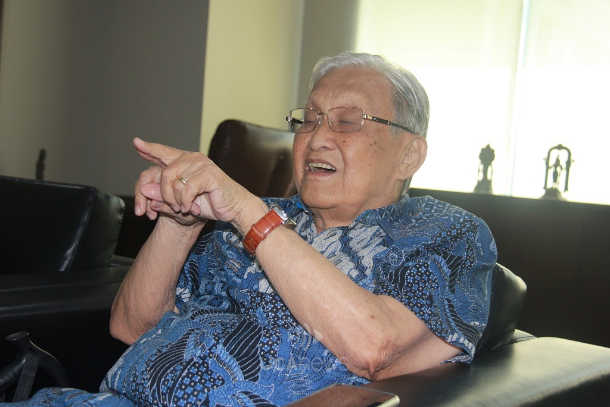
Senior Catholic politician Harry Tjan Silalahi. (Photo by Konradus Epa/ucanews.com)
Former politician and co-founder of the Indonesian think-tank, the Centre for Strategic and International Studies (CSIS), Harry Tjan Silalahi, says he is proud to have let his Catholic faith influence his political career.
His piece of advice for a younger generation is that in whatever circumstances Catholic politicians find themselves in, they must never forget that they are not in politics by chance, but are called to be the salt and light of the world.
The advice comes as candidates prepare to contest regional elections next year in 270 provinces, municipalities and districts, including Catholic majority Flores Island.
Tjan, 85, embarked on his own political path when he was a 16-year-old high school student, after which he said his Catholic faith has been tested and forged through his involvement in politics.
He said he entered politics because he wanted to fight Dutch colonial rule that gripped the archipelago for three and a half centuries (1602-1942), and Japanese occupation during World War II.
“I was studying in a Dutch school, but my friends and I could not stand the suffering caused by Dutch and Japanese colonialists on Indonesian people,” Tjan said.
He then joined various organizations including Chung Lien Hui, a Chinese youth group and the Indonesian Students Association in Yogyakarta.
After his graduation, he moved to Jakarta to study law at the University of Indonesia. There too, as a university student, he joined various groups.
“However, I wasn’t aware that taking part in those activities was involving myself deeper in politics,” said Tjan, 85.
While a university student, he became chairman of Sin Ming Hui, a Chinese group in Jakarta, and chairman of the Indonesian Catholic Students Association.
Things did not end there.
After graduating, he joined the Catholic Party and became its general secretary. He also later became a legislator (1967-1971) and a member of the Supreme Advisory Council (1978-1983) a group appointed by the president to respond to any presidential question regarding state affairs.
“As a Catholic, I was really proud when I was involved in such activities,” Tjan said.
Through these activities, he encountered several Jesuit and other priests who were also involved in politics.
He said some priests have played important political roles, such as the late Dutch Jesuit missionary Father Josephus Gerardus Beek (1917-1983).
Together with the priest and other figures, Tjan established the CSIS, which is now a think-tank respected not only in Indonesia but also across Southeast Asia.
Through this organization, Father Beek educated many lay Catholics in politics.
Other leading CSIS figures, such as the late army general, Benny Moerdani, Sofyan Wanandi, Jusuf Wanandi, influenced policies during the New Order regime of authoritarian president Suharto.
Despite his advancing years, Tjan is still active and still speaks at many seminars and conferences on politics and law.
He said unlike many years ago when the Catholic Party — dissolved in 1973 — was the only choice for Catholic politicians, the present crop has many options.
They now join various parties across the political spectrum, ones that are in government or are in opposition.
"Lay Catholics have a mission in these parties, to become the salt and light for the world," he said.
Indonesian Catholics need to take advantage of Indonesia being a secular nation so the presence of a religion-based political party is not needed, according to Tjan.
“The good thing is that opportunities for Catholics to thrive in political parties are there,” he said.
Must stay with the Church
In the Catholic Church, he said, the hierarchy (bishops and priests) have played an important role in fostering the spirituality of Catholics. Therefore, Catholic politicians must stay closer to the Church, working closely with religious organizations such as the Indonesian Bishops Conference.
They will stand out among the crowd, among their peers, if they always ground themselves in “our faith values such as love, brotherhood, unity and peace.”
The Catholic Church under Pope Francis, he said, has emphasized these faith values more.
Catholic politicians must support the mission of the Indonesian Catholic Church in interfaith dialogue, particularly with the Muslim majority.
This is a much more demanding task, as Indonesia is facing many challenges from radical and extremist groups.
Working with moderate Muslims in fighting extremism is not optional, but a call for Christians in this Muslim majority nation.
Inspiration for young politicians
Stefanus Roy Rening, former chairman of the now-defunct Catholic Democratic Party, agrees with Tjan.
“He is someone who never gives up encouraging us, young people, to work for the nation and the Church at the same time,” he said.
When everyone else rejected the establishment of Catholic Democratic Party in 1998 — as they thought a religious-based party was no longer needed — Tjan stood up and supported it, even though it did not last.
“He always helps whenever we have difficulties,” he said.
Vincentius Hargo Mandiraharjo, chairman of the Association of Indonesian Catholic Intellectuals (ISKA), said his organization respects Tjan as a figure who consistently promotes Catholic values.
He said Tjan has lived the motto of the Indonesian Church: a hundred percent Catholic and a hundred percent Indonesian.
Yoseph Belawa Liwun, chairman of the Kasimo Foundation — a Catholic organization named after the late national hero and Catholic politician, Joseph Kasimo — said Tjan is a figure who inspires young people to keep working for pluralism.
"He is a man of integrity who cares very much about national unity,” he said.


